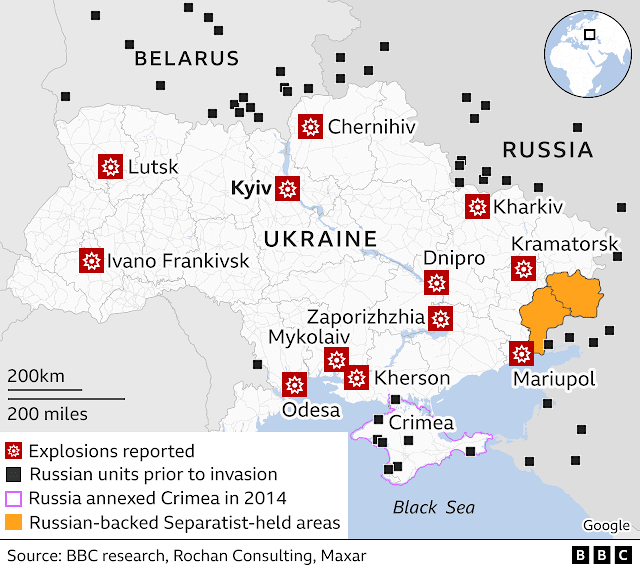ANALYSIS: The View From Beijing on the Russian Invasion of Ukraine
Across the previous decades, despite a growing economic importance, China managed to distance it rather well from affairs it did not wish to be a part of. When two parties collided Beijing was astute at walking a careful balancing act and remain aloof of the controversies between foreign powers. Yet now, Beijing's political weight is beginning to catch up with its economic weight and forcing it to stake a position on the worlds most contentious and dangerous geopolitical issue, the conflict in Ukraine.
A Balancing Act
At the UN security council on the Monday prior to the Russian invasion, China's representative, Zhang Jun, called for 'restraint', following Putin's recognition of Donetsk and Luhansk as independent states. Zhang reiterated that matters should be settled by 'peaceful means', the line China has taken ever since the crisis began. For a world power who has seen in the past to be extremely close with Russia, these are noticeably non-committal statements. In 2021, China and Russia conducted joint-naval exercises and issued a 5,000 word statement on February 4 against the enlargement of NATO. The statement termed NATO a Cold War relic, whilst in the past both nations have criticised perceived anti-China groupings such as AUKUS, between the US, Australia and the UK as well as the Quad, between the US, India, Japan and Australia. The joint statement was furthered by the announcement of a $117.5bn oil and gas deal between the pair, that reduced Russian financial reliance on Europe.
Yet Russia's moves in Ukraine place China in a surprisingly awkward position. China is innately hostile to the recognition of separatist regions, largely due to problems in its own periphery, including in Tibet, Hong Kong, Xinjiang and suffice to say its estranged brothers in the Republic of China. China never recognised the Russian annexation of Crimea in 2014, nor the independence of separatist republics it has created in the past, such as South Ossetia or Abkhazia. Nor is it likely to recognise either Donetsk or Luhansk. Indeed, another complication in China-Russian relations is China's close economic relationship with Ukraine itself. In 2020 trade between the two amounted to a not insignificant $15.4bn, with Ukraine exporting key raw materials like ore, slag and ash, all of which are very important to Chinese construction firms. In June 2021, Kiev and Beijing agreed to expand the Chinese investment in Ukrainian infrastructure such as roads and railways that could further improve the supply chain.
Geopolitical Considerations Since War Began
Indeed, the way in which China has attempted to navigate the Russian invasion has been equally nuanced, albeit with a pro-Kremlin lens. Initially, China refused to call the Russian invasion a war, whilst similarly refusing to criticise the actions of President Putin. China has ensured its state media remain pro-Russian, whilst occasionally republishing false reports by the Russian state media. However, substantial, material support towards Russia has not been forthcoming. Chinese officials are not willing to risk its own financial gains in order to prop up Putin, nor to subvert the evermore severe western sanctions. Simply put, China prioritises China. Indeed, China's waning support for Russia can be seen in a number of smaller actions. Yesterday, China called the conflict a 'war' for the first time, whilst donating a small amount of aid to Ukraine, as well as refusing to re-supply Russian airlines with aircraft parts. The previous week, at the UN security council vote to condemn the invasion, Putin's ally did not vote against the proposal, but instead abstained. It is not a major repulse to Russia, but it is indicative of the tightrope Beijing attempts to walk, a tight rope that will become more and more difficult to maintain as the scale of the conflict and the scale of sanctions, increases.
China thus faces a number of issues when supporting Russia. It does not wish to hasten the formation of global opposing blocs akin to the Cold War. It does not want its domestic initiatives, including the important 20th National Party Congress to be disrupted and also, Russia is simply not that popular an ally to the Chinese people. Putin and Xi may get on well, but the Chinese people remember the cold war hostility of the Soviets, including the 1969 border conflict, as well as possessing generally dim views of conflict on this scale as a whole. For the world, including China, there is no easy solution to Russia's invasion of Ukraine.
 |
| President Putin alongside his Chinese counterpart, Xi Jinping (Alexei Druzhinin/Sputnik/AFP) |


Comments
Post a Comment